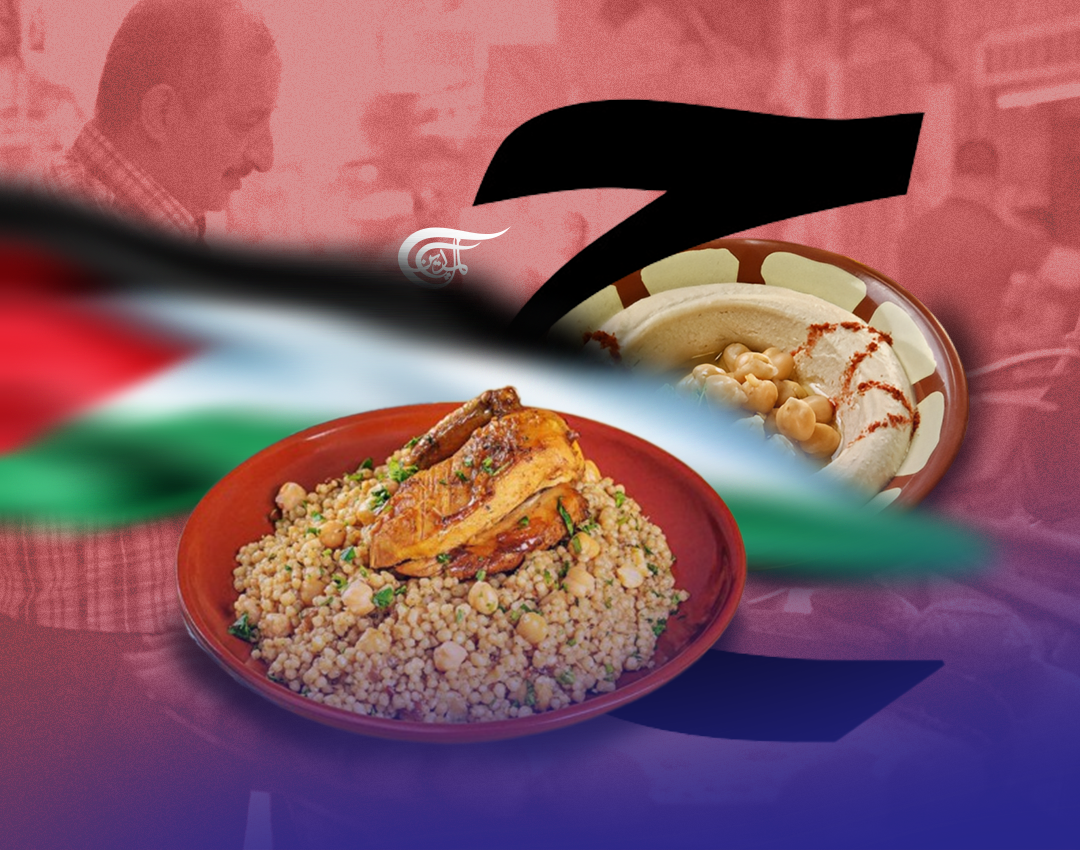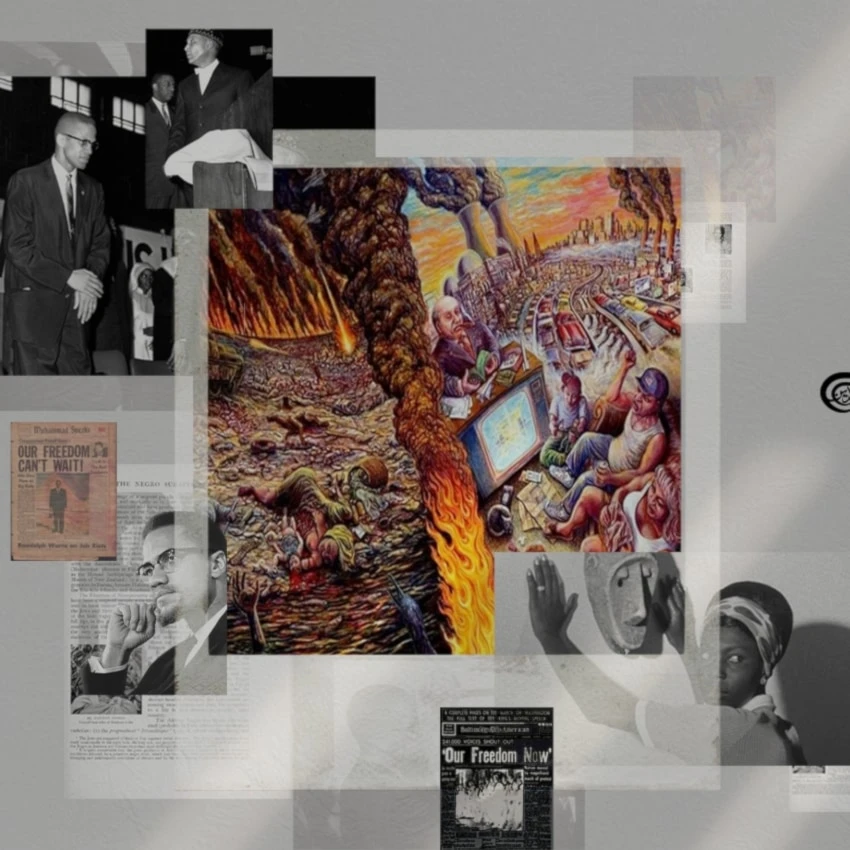'Israel’s' largest Surface Cultural Heist: Palestinian Cuisine
Why does "Israel" appropriate Palestinian and Arab food, but not food brought from Russia, Poland, or America? It is simply because Palestinian food provides the Israeli made-up top-down culture with a distinctive surface cultural identity.
-

Hummus is much more alien to Israeli cuisine than burrito and pizza to American kitchens. At least burrito and pizza share the same root in Latin letters; the Arabic word "hummus" does not exist in the spoken Israeli language.
This is the fourth of a series of articles that will explore Zionist myths, artificial history, and made-up culture. For the first article: 'Israeli' Invention of Artificial Reality, for the second article: 'Israel': A 'fairytale' history, for the third article: Israeli Invention of National Symbols.
In continuation of my previous article exploring the Israeli invention of national symbols and landmarks, this piece delves further into the appropriation of Palestinian surface culture by "Israel".
Surface culture encompasses tangible and observable elements that contribute to the distinctive identity of a cultural group or region. Music, food, dress, and other aspects often define a nation's surface culture. For instance, Scotland is recognized by men's kilts, Salsa music represents Latin American culture, and Japan is known for its Sushi cuisine.
Authentic culture evolves organically over generations. However, "Israel's" top-down approach to culture lacks genuine identifying characteristics. Throughout its history, "Israel" has either fabricated, annexed, or reconstructed both surface and deep cultural elements through falsehoods, myths, and fables. Unlike conventional development of cultures, Israeli surface culture came prepackaged—American fast-food style—by appropriating those very elements from the age-old traditional Palestinian culture.
A prominent aspect of any society's surface culture is its local cuisine. In 1948, "Israel" ethnically cleansed Palestine of the non-Jewish Palestinians, took over their land, and brazenly claimed Palestinian culinary treasures like hummus, falafel, baba ghanouj, tabouli salad, couscous (maftool), freekeh, kubbeh, mujadara, pita bread, and many more. All it took was to identify a Palestinian dish and then add the noun "Israeli" before its name.
Enumerating the complete list of plagiarized Palestinian cuisine is too long to be explored in greater detail, especially as Western familiarity with Palestinian culinary culture remains limited. Thus, this article will expose "Israel's" largest surface culture heist in history by focusing on two internationally renowned dishes: hummus and falafel.
Let's begin by exploring the word "hummus" to understand its origin and meaning in the Arabic language. In Arabic, "hummus" literally translates to chickpeas or garbanzo beans and does not mean mash, dip, or paste. The word "hummus" is used as an abbreviation of the full Arabic term that refers to the famous dish "hummus bitahini." This means mashed chickpeas, tahini sauce, and garnishments. Tahini, a ground sesame butter, is an essential ingredient in the making of hummus and baba ghanouj dips.
Hummus is much more alien to Israeli cuisine than burrito and pizza to American kitchens. At least burrito and pizza share the same root in Latin letters. The Arabic word "hummus" does not exist in the spoken Israeli language, Hebrew. In fact, Hebrew speakers would be challenged to master the orthoepy of the word "hummus." As there is no hard "h" (ح) in the Hebrew syllabary, and in general, when Hebrew speakers attempt to enunciate "hummus," or any Arabic word with a hard "h" (ح), they mispronounce it as "kh" (خ), in this case "khummus," not "hummus."
The full name of the dish becomes more challenging when adding its second part, tahini. The "h" in tahini is also a hard "h" (ح), where an Israeli would distort the Palestinian dish "hummus bitahini" to "khummus bitakhini." This is an insult to the language, culinary etiquette, and to Arab chefs in the Levant kitchen.
To paraphrase Palestinian-American comedian Mo Amer, "hummus does not exist in your lexicon, you can't pronounce it, how can it be your national food?"
Similarly, when studying the etymology of falafel, a derivative of the Arabic word "falfala," to jazz it up with spice. Falafel is basic hummus (coarser chickpeas mush) without the tahini sauce in the mix, adding spices like coriander, cumin, onions, fresh parsley, etc. A special tahini and hot pepper sauce (falafel sauce) is spattered over the fried falafel in the pita bread wrap.
There is an unsettled debate about whether falafel originated in Palestine or Egypt. Either way, the main ingredient in the Palestinian falafel is chickpeas, whereas the Egyptian version uses fava beans. The garnishment varies slightly. The Israeli-appropriated falafel is an identical copy of the Palestinian variety.
Another preposterous claim, couscous, a North African dish―maftool is its Palestinian sister dish―is an Israeli food. The basis for this brazen lie is that semolina was supposedly similar to "solet" or wheat flour mentioned in the Old Testament. Claiming exclusivity over wheat flour, a major food staple item eaten by all humans in that era, is dishonesty beyond arrogance.
The audacity to claim a national food because one item, wheat flour, was similar (it's not even close) to semolina, in a dish that consists of more than ten different ingredients is irrational and absurd. It's almost like if the United States declared Mexican quesadilla an American food because, according to the American food bible, cheese is used widely in hamburgers.
Even more amusing is when an Israeli writer posited that hummus and eggplant (baba ghanouj) were "Israeli foods" because that's how the Spanish Inquisition identified secret Jews, from the food they ate. Or a similar hypothesis arguing that foods such as hummus, falafel, freekeh, etc. were brought by Jews who came from the Arab world.
Of course, the diverse citizenry of the Arab world, or the Muslim/Arab Spain must have had hummus and eggplant in their cultural diet. Jewish citizens cooked and ate the food because they lived in the culture that produced the food, not because they created the food for that culture.
Since Israelis contend that Jews have the right to claim foods brought with them as Israeli food, why then don't they claim Russian dishes like kasha or golubtsy as Israeli food? Better yet, why don't Israelis from New York claim American steak as an Israeli food too?
The above points raise a serious question: Why does "Israel" appropriate Palestinian and Arab food, but not food brought from Russia, Poland, or America? It is simply because Palestinian food provides the Israeli made-up top-down culture with a distinctive surface cultural identity. It also features atypical exotic culinary to Western kitchens, making it a lot easier to hoodwink the West regarding the origin of their made-up surface culture.
The chutzpah of claiming Palestinian culinary treasures is not only historically inaccurate, but also offensive and disrespectful. It is quite common for countries to adopt elements of other cultures, including their cuisine. American cuisine, for instance, celebrates a rich tapestry of international dishes such as Asian, Italian, and Mexican food. However, the foods remained appreciated for their origin, with no urgency to appropriate it as America's national food.
It could be that, unlike "Israel", the United States does not have the same obsessive need to fake a culture to justify its existence. In contrast, the Zionist movement envisioned "Israel's" survival as being predicated on erasing the history of the rich heritage of Palestine’s culture and its people.

 Jamal Kanj
Jamal Kanj
 7 Min Read
7 Min Read











